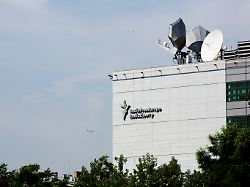A “cat and mouse game”
US broadcaster uses YouTube to circumvent Kremlin censorship
February 11, 2024, 6:59 p.m
Listen to article
This audio version was artificially generated. More info | Send feedback
The US station Radio Free Europe has been broadcasting in Russian since the beginning of the Cold War. Since the Russian attack on Ukraine, reporting has been more in demand than ever. The broadcaster always has to show creativity in order to circumvent the Russian internet blocks.
Anyone who wants to visit the headquarters of the US foreign broadcaster Radio Free Europe/Radio Liberty (RFE/RL) must undergo strict security checks. Bulletproof glass and thick walls protect the complex on Vinohradska Avenue in Prague, where the broadcaster has been based since 2009, from attacks. The steel doors slam shut loudly. Hundreds of journalists work here to broadcast programs in 27 languages to listeners in 23 countries.
The station is now again paying particular attention to a region that had since moved somewhat into the background: Eastern Europe. Andrey Shary directs the Russian-language programs operating under the Radio Swoboda (Radio Freedom) and Current Time TV brands. After the start of the Russian invasion of Ukraine in February 2022, the number of listeners and readers skyrocketed, reports Shary – more than at any time since the coup attempt against Gorbachev in 1991. But reprisals against foreign media in Russia also increased.
High risk of reporting on Russia
After more than 30 years, the broadcaster had to close its office in Moscow, where around 100 journalists had worked. Most of them are now based in Riga, Tbilisi or Yerevan. “Nevertheless, we still have a presence on the ground, and I think this is urgently needed in order not to lose touch with developments in Russia,” reports Shary. The employees on site are told openly what this means for their personal safety. The case of RFE/RL journalist Alsu Kurmasheva shows how great the risk is of falling into the wheels of the Russian justice system. The Russian and US citizen has been in custody in Kazan for more than three months.
She is accused of failing to register as a “foreign agent.” In Russia, people, media and organizations are branded as foreign agents if they receive money from another country; The aim is to stigmatize them as spies who work in the interests of other states. Kurmasheva only wanted to stay in Russia for two weeks to visit her old and sick mother, says her husband and RFE colleague Pavel Butorin. “They basically took them hostage,” he complains. It is clear that their fate will be decided in Moscow. Her two children kept asking about their mother, says Butorin.
Russia has hindered the broadcaster since the Cold War
Radio Free Europe was founded in 1949 at the height of the Cold War. Initially it was an anti-communist project of the US secret service CIA, today the annual budget of more than 100 million euros comes from the US Congress. Until moving to Prague in 1995, RFE/RL broadcast from a large building complex at the English Garden in Munich. At that time, jammers affected reception in the Eastern Bloc. Today, state internet censorship is taking effect in Russia. The Russian authorities have been blocking the websites of the TV news channel Current Time and Radio Svoboda for almost two years.
In Prague, people are constantly looking for ways out – a “technical game of cat and mouse,” as Shary says. Social media such as Telegram and YouTube, which are not blocked in Russia, are particularly important as a platform. YouTube can be used not only for videos, but also for podcasts and even texts. They have also developed their own smartphone apps. “But not everyone has the courage to install the apps because the police could check their cell phone,” says Shary. Many listeners and viewers would use a so-called VPN tunnel at home to bypass the Internet blockage.
Ukraine and Russia offices next to each other
Radio Free Europe tries to reach listeners beyond the liberal-minded circles in St. Petersburg or Moscow. “You can’t tell them that all Russians are bad – we have to speak to these people in a language they can accept,” says Shary. This also includes addressing local problems that affect people’s everyday lives. This is called “hyperlocal journalism”. The colleagues from the station’s Ukrainian-language program sit just a few steps away from the Russian-language service. Since the beginning of Russian aggression, additional funding has been received and a new office has been opened in Lviv, reports its director Maryana Drach.
More than a hundred journalists reported daily from Ukraine, with a focus on investigative journalism – and also directly from the front. It’s not a safe job: Just recently, a reporter in the southern Ukrainian region of Zaporizhia near Robotyne came under Russian artillery fire and was seriously injured in the leg, says Drach. Almost two years ago, producer Wira Hyrytsch died when a rocket hit her apartment in Kiev. Drach says: “Their fate is an example for many Ukrainian civilians who have become innocent victims of the war.”
